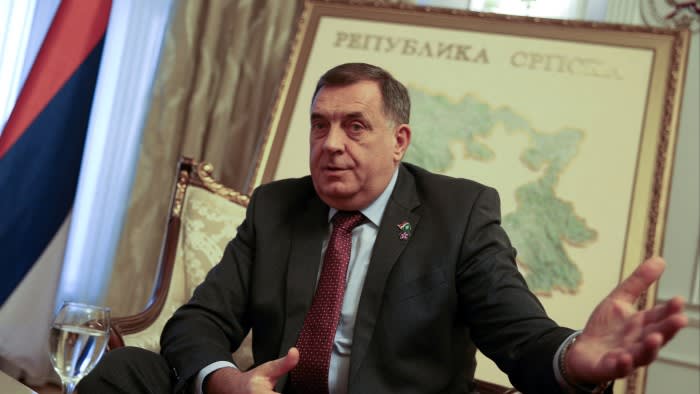Željko Komšić, a Croat who currently chairs Bosnia’s collective presidency, has argued the state’s prioritisation of ethnic representation in government is reminiscent of totalitarianism © Samr Jordamovic/Anadolu/Getty Images
Speaking in September at the UN General Assembly, he said:
Bosnia and Herzegovina does not entail complete democracy, but rather a form of ethnocracy. Such a system, which guarantees participation in government to certain political actors and their ethnically based political parties, has the form of former and current totalitarian systems.
A superb analysis of what I have called “the dismal politics of ethnic partition” in Bosnia appeared in June in this essay by Berta López Domènech for the European Policy Centre think-tank.
She correctly identified the US-brokered 1995 Dayton peace accord as one of the chief causes of Bosnia’s unhappy situation today. She wrote:
In a country of slightly more than 3mn people . . . there are 13 parliaments, five presidents and around 150 ministries. Dayton allocated power along ethnic lines and granted veto rights to each constituent people — i.e., Bosniaks, Serbs and Croats …
Nationalist leaders have constantly abused the blocking mechanisms to boycott the normal functioning of the institutions, plunging Bosnia into a permanent state of political stalemate …
The division of the political system along ethnic lines has also paved the way for corrupt practices. The main nationalist parties . . . have benefited from the ethnically segregated system, capturing the state to serve their interests and consolidate their control over institutions and public companies.
These acute problems are reinforced by the weak sense of pan-Bosnian identity. Kristian Nielsen, writing for the Geneva Graduate Institute’s Albert Hirschman Centre of Democracy, explains:
Each of the main ethnicities — Bosniaks, Serbs and Croats — have a strong sense of self, and each have their own historical narratives, yet the overarching national identity remains contested.
Most Serbs and Croats identifying with neighbouring states (and often holding dual citizenship), rather than the one in which they live, only complicates this picture.
Democracy or stability in the Balkans?
Here is the central problem with the EU’s approach to potential Bosnian entry into the club. Democracy is a condition of membership but, by upholding Bosnia’s ethnically based political system, the EU may actually be entrenching anti-democratic tendencies.
This is the argument of a good recent report by the Clingendael Institute of the Netherlands, which detects similar problems across the Balkans:
The [western Balkan six] have slowly developed into “stabilitocracies”: countries with obvious democratic shortcomings that at the same time claim to work towards democratic reform and offer stability …
Engagement with political leaders rather than civil society in Bosnia and Herzegovina . . . hampers effective democratisation.
Court rulings
The European Court of Human Rights has ruled on several occasions that Bosnia’s political set-up discriminates against citizens who claim the right to democratic representation irrespective of their ethnicity. In a judgment in August (Kovačević vs. Bosnia and Herzegovina), the ECHR found that
. . . the current political system rendered ethnic considerations and/or representation more relevant than political, economic, social, philosophical and other considerations and thus amplified ethnic divisions in the country and undermined the democratic character of elections.
Future prospects
It’s true that, by adopting a step-by-step approach, the EU may be able to bestow some benefits of EU membership on Bosnia before it is ready for full accession.
It’s also true that, whatever the defects of Dayton, the peace accord did at least end the horrendous war of the 1990s.
However, if Bosnia and Herzegovina is to join the EU as a full member, its disastrous ethnically based political system will need to be thoroughly reformed.
Don’t forget the Balkans — a commentary by Ivan Vejvoda for Aspenia Online
Tony’s picks of the week
A pattern is becoming clear in India’s trade policy: access to the growing markets of the world’s fifth-largest economy will depend on offering something in return, the FT’s John Reed reports
Alexei Navalny challenged Vladimir Putin’s system of power in Russia and paid the price with his life, but why are there no equivalents of Navalny in China? — an analysis by Peter Fischer for the Neue Zürcher Zeitung
Recommended newsletters for you
Britain after Brexit — Keep up to date with the latest developments as the UK economy adjusts to life outside the EU. Sign up here
Working it — Discover the big ideas shaping today’s workplaces with a weekly newsletter from work & careers editor Isabel Berwick. Sign up here
Are you enjoying Europe Express? Sign up here to have it delivered straight to your inbox every workday at 7am CET and on Saturdays at noon CET. Do tell us what you think, we love to hear from you: europe.express@ft.com. Keep up with the latest European stories @FT Europe
Source link : https://www.ft.com/content/0364ce44-0192-48fa-9a86-e5f7a5af330d
Author :
Publish date : 2024-03-23 07:00:00
Copyright for syndicated content belongs to the linked Source.
